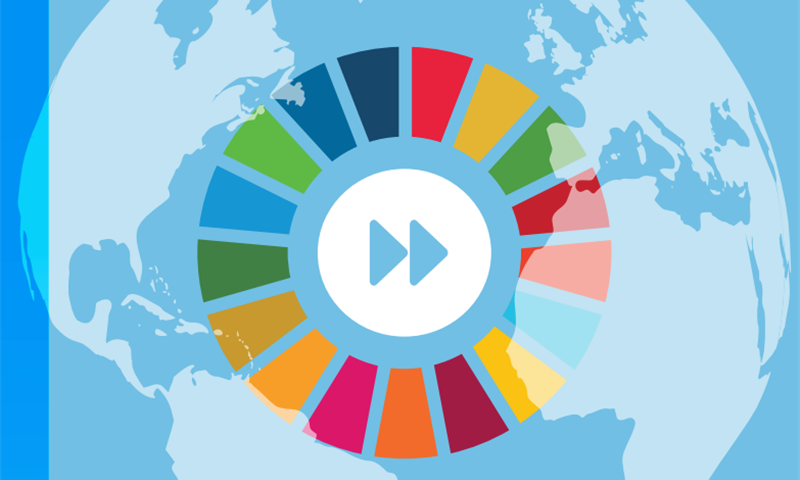
The UN Sustainable Development Goals (SDG) adopted in 2015 invite global action by 2030 in three overarching areas: end poverty, combat climate change and fight injustice and inequality. Today we see ICT as a powerful enabler for each of the 17 goals, and an essential catalyst in driving rapid transformation of nearly every aspect of our lives.
In the new publication “Fast-Forward Progress: Leveraging Tech to Achieve the Global Goals”, the leaders of 17 United Nations agencies and international organizations each select one of the 17 Sustainable Development Goals (SDGs) from the 2030 Agenda for Sustainable Development, and tell us how information and communication technologies (ICTs) could help them to achieve these goals.
The SDGs are ambitious and include ending poverty and hunger, achieving gender equality, and reducing inequality.
This report is about a very complex and fast-changing world, it is about our children, our food, our air, our cities, our oceans. It is about trade, migration, crime, education, work and justice.
Here are five lessons from “Fast-Forward Progress: Leveraging Tech to Achieve the Global Goals”:
The first thing to remember is that today 3.9 billion people are cut-off from the vast resources available on the Internet such as news, education and banking. What would you do if you were one of them?
A central promise of the 2030 Agenda is to leave no one behind. At ITU, we are committed to leave no one offline. It is our responsibility to bring the power of ICTs to all nations, peoples and communities.
Gender equality is a perfect example of where we need to focus our efforts. Men continue to outnumber women in terms of access to mobile phones and Internet usage in all regions of the world.
A number of contributors to this report cite the impact of big data, sensor networks, autonomous robots, machine learning and artificial intelligence. The technological revolution is now rapidly extending beyond people to objects. It’s changing how we communicate, and it’s an accelerator for innovation and change.
Farmers use satellite imagery to monitor land use, water scarcity and shifting climate patterns. ICTs improve capabilities to gather, analyse, manage and exchange information in all areas of health, from research on molecular genetics to large-scale humanitarian interventions. All these changes have one thing in common: big data. Its potential for the public good is enormous.
The need to put people first, be it children, workers or refugees, is a main concern for many of the humanitarian leaders featured in this report.
Sometimes it’s hard to fully comprehend the scope of a human crisis unfolding before our very eyes. War, violence and persecution continue to uproot millions of men, women and children around the world each year. On average, 20 people were driven from their homes every minute last year, or one every three seconds – less than the time it takes to read this sentence.
For many refugees Internet and mobile connectivity have a similar level of importance as basic needs such as water, food and energy. Why? Because digital connectivity can mean finding a job and having an income or reuniting with loved ones.
“… if access to ICT-enabled services is limited to privileged groups, gaps could increase and hold back the disadvantaged from access to well-paid jobs.” – Houlin Zhao, ITU Secretary-General
Tech innovation is transforming nearly every aspect of how we live. Cyber-physical systems now enable customized products and industrial production in real-time across great distances. E-commerce has reduced trade costs, expanded market access, increased consumer benefits – and offers new opportunities for employment, training and skill improvement.
Contributors to this report, though, cite the importance of being vigilant – and never complacent – in identifying ways to leverage ICTs. While connectivity and access to ICTs are critical, complementary actions to increase confidence and trust are necessary for people to access greater opportunities and reap tangible benefits. ICTs can reduce learning gaps in unprecedented ways, especially for low-income countries but if access to ICT-enabled services is limited to privileged groups, gaps could increase and hold back the disadvantaged from access to well-paid jobs.
One of the main lessons of this report is that strong partnerships are crucial to realize the SDGs. The international community has a responsibility to promote more effective collaboration, to avoid widening the divides between those positioned to reap the rewards of technological change and those that risk being left behind.
The private sector also has a critical role to play. Now more than ever, we need fresh investment and collaboration models to unlock the power of ICT connectivity and fast-forward progress to achieve the SDGs.
Source: ITU
 Welcome to the United Nations
Welcome to the United Nations